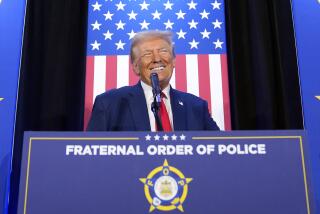Bill’s Support Marked by Contradiction
- Share via
WASHINGTON — The headline of a recent press release from Rep. Elton Gallegly (R-Simi Valley) makes a bold claim: “Nation’s Largest Coalition of Law Enforcement Officers Strongly Endorses Gallegly Education Amendment.”
Actually, virtually every major police organization, including the nation’s largest, has opposed Gallegly’s proposal to allow states to ban illegal immigrant children from public schools.
The text of Gallegly’s press release explains the apparent contradiction: The congressman has won the endorsement of the Law Enforcement Alliance of America, which calls itself “the largest coalition of law enforcement officers, crime victims and concerned citizens.”
The alliance was founded in 1991 with financial help from the National Rifle Assn. in an effort to show that many officers part company with mainstream police groups over gun control legislation.
“There certainly is disagreement among law enforcement on immigration,” said executive director James T. Fotis. “Our opinion is one of many out there. But I’ll bet if you talked to the guys who are out there on the street, many of them are with us.”
Yet the extent to which the alliance represents rank-and-file police officers is hotly contested.
The Fraternal Order of Police, the biggest police group with 278,000 members, has said the Gallegly provision in the House immigration bill would “turn innocent kids with boundless potential into wards of the street.”
The International Union of Police Associations, a national union for law enforcement officers, says the Gallegly amendment would cause “law enforcement officers . . . [to be] overwhelmed at a time we can ill afford the extra pressure.”
The National Assn. of Police Organizations, which represents 185,000 officers, maintains the public-schooling ban “would be disastrous for innocent children, the American public and for law enforcement as well.”
Also opposing Gallegly on the issue are the International Brotherhood of Police Officers, the Major Cities Chiefs, the National Black Police Assn., the Police Executive Research Forum, the National District Attorney Assn., Los Angeles County Sheriff Sherman Block, and police chiefs in Chicago, Miami, Philadelphia, Sacramento, San Diego, San Jose, Santa Ana, and Sioux City, Iowa.
Gallegly, however, insists that the Law Enforcement Alliance of America is more in tune with the average cop than the array of organizations that oppose the schooling ban.
Based in Falls Church, Va., the alliance claims to have 50,000 members, some of whom are police officers.
The organization frequently espouses contrarian views. Its first president was Leroy Pyle, an NRA board member and former San Jose street cop. Current President Richard Beckman, a recently retired sergeant with the Cloverdale, Calif., police, calls the alliance “America’s premier pro-gun law enforcement organization.”
Fotis, the organization’s executive director, is a former officer who contends that the group represents the viewpoints of many badge-holders.
“Throughout this debate, we’ve been hearing that law enforcement supposedly opposes my amendment,” Gallegly said. “Well, I think this endorsement finally puts that question to rest.”
Gallegly notes that law enforcement officials in his district, including Ventura County Sheriff Larry Carpenter, Ventura Police Chief Richard Thomas, Simi Valley Police Chief Randy G. Adams and Ventura County Dist. Atty. Michael D. Bradbury have strongly endorsed the public-schooling ban.
Others accuse Gallegly of exaggerating his support.
Jim Pasco, executive director of the Fraternal Order of Police, said he does not consider the alliance a legitimate police group because anybody can join simply by sending in a $20 check.
The rivalry among police groups is nothing new.
In 1992, police organizations found themselves divided over which presidential candidate, George Bush or Bill Clinton, would be best for the nation’s officers.
The Fraternal Order of Police and National Troopers Coalition endorsed then-President Bush. The National Assn. of Police Organizations, the International Union of Police Assns. and the International Brotherhood of Police Officers sided with Clinton.
Two police groups, the National Sheriff’s Assn. and the National Troopers Coalition, have opted not to take a public stand on the immigration bill.
Besides police officers, supporters of the Gallegly amendment have been rounding up educators, taxpayer groups and politicians to buttress their case.
The rush for endorsements has picked up steam in recent weeks as House and Senate conferees move closer to a compromise immigration package to send to the president. The Gallegly provision, which is not included in the the Senate’s version of the bill, remains the biggest source of disagreement.
More to Read
Sign up for Essential California
The most important California stories and recommendations in your inbox every morning.
You may occasionally receive promotional content from the Los Angeles Times.













